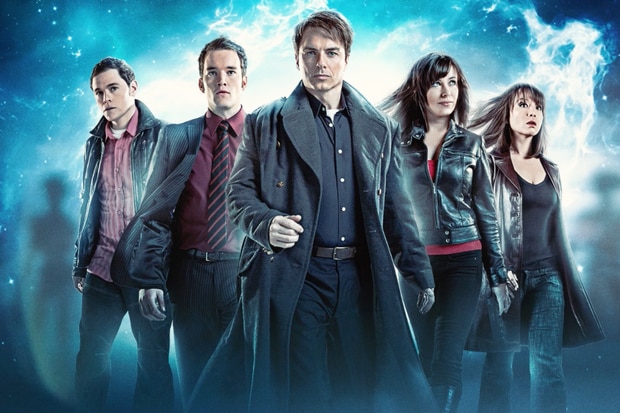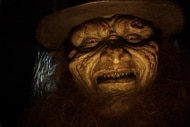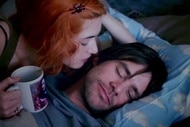Create a free profile to get unlimited access to exclusive videos, sweepstakes, and more!
Torchwood is essential queer television masquerading as science fiction

Last week’s Doctor Who New Year's Special, “Revolution of the Daleks,” gave us — in addition to the introduction of a new companion and the departure of Graham and Ryan — our first taste of Captain Jack Harkness since his surprise reappearance in Season 12’s “Fugitive of the Judoon.” Though for many fans, seeing Jack return to the Whoniverse was a long-awaited delight, for many younger Whovians and those new to the universe, this was the first taste of the smart-mouthed swashbuckler, and it couldn’t have come at a better time. Not only did 2021 mark Jack Harkness' return, but it also marks the 15th anniversary of Torchwood, the Jack-led spinoff of Doctor Who. For some fans, Torchwood isn’t much more than a short-lived spinoff, however. The series is a landmark piece of queer television, masquerading behind truckloads of science fiction.
It’s difficult to understate the significance of Jack Harkness' role in Doctor Who — prior to his debut, the franchise (which at that point was a cultural institution with 30-plus years of history) had never had an (out) LGBTQ+ character. Of course, that all changed with the introduction of showrunner Russell T. Davies (at that time most well known as the creator of Queer as Folk), who ran the Doctor Who reboot from 2005 to 2010. Davies would go on to revitalize the franchise with a number of critical decisions that led to a decade of prosperity, and one of those many decisions was the introduction of John Barrowman as Captain Jack Harkness, an immortal, “omnisexual” time traveler whose good looks were matched only by his penchant for innuendos.
Jack proved to be such a well-loved character that he garnered a series of his own: Torchwood, which first hit British airwaves in 2006. The series followed Captain Jack as he defended the earth from alien threats of all shapes and sizes with the aid of an ace team — all of whom happened to be canonically queer.
No, you didn’t read that wrong. By the end of the show's first season, every major character on Torchwood — Gwen, Owen, Tosh, Ianto, and, of course, Jack — was established as being canonically queer. For any television show to have its entire cast be queer would be a massive feat by today’s standards (and one that would also likely engender quite a bit of backlash), but Torchwood was able to pull it off all the way back in 2006. Not only that, but Torchwood explored concepts of sexuality and identity in a way that both honored the characters while never detracting from the storytelling.
Far too often, shows that feature queer characters in their ensembles (looking at you, anything produced by Ryan Murphy) fall into the unfortunate pit of defining queer characters by their sexualities. Often, their emotional growth and development revolve around their sexual identities and (frequently) their coming-out journeys. While coming out and discovering one's sexuality certainly isn’t an invalid experience, it’s a narrative that grows tired when it becomes the default storyline for a TV show’s queer characters.
Torchwood takes an entirely opposite approach by presenting queerness and the spectrum of sexuality as a fact of life that all characters experience in some capacity, thus freeing up the show’s narrative to explore alien threats and interpersonal relationships without being hung up on having all of its characters come out one-by-one. When describing his approach to depicting sexuality in Torchwood, Davies told the Gay Times in October 2006: "Without making it political or dull, this is going to be a very bisexual program. I want to knock down the barriers so we can't define which of the characters is gay. We need to start mixing things up, rather than thinking, 'This is a gay character and he'll only ever go off with men.'"
Davies certainly stuck to his guns. The presentation of every character on Torchwood (albeit in often drastically different capacities) helps to reinforce the aforementioned idea of breaking down barriers and conceptions as to what queerness is supposed to look like. Every member of the Torchwood team is canonically queer, but that doesn’t define who they are, it’s just one aspect of their multi-faceted personas. Gwen struggles with infidelity, Owen fights bouts of depression and self-loathing when he’s not having an affair with Gwen, Tosh is crippled by loneliness and pining, and Ianto leads an entire secret life right under the others’ noses. None of them are one-note, and none of them are defined by their sexuality — but it isn’t downplayed or swept under the rug, either.
Torchwood thrives in incorporating queerness naturally into its narrative, yes, but it also shines in how it depicts the vast spectrum of what it means to be LGBTQ+. For characters like Gwen, Owen, and Tosh, their onscreen queerness is a casual revelation, never remarked upon or highlighted — it’s simply there. In Season 1, Episode 7, “Greeks Bearing Gifts,” Tosh falls for an alien who gives her a pendant that allows her to read minds, and the show (rightly) places emphasis on the fact that her new companion is an alien, not that she takes the form of a human woman. It’s an example of the series putting Davies’ words into action by actively working toward a version of the world where monosexuality isn’t the default.
But, of course, for other Torchwood characters, sexual identity plays a more significant role in their arcs — but it still never defines them. Though Torchwood quickly establishes Gwen Cooper as its protagonist, the show’s most memorable and lasting romance is between Ianto Jones and Jack Harkness, the former of whose sexuality and coming out was a major part of his character, especially in the episodes leading up to his tragic demise in “Children of Earth.” Ianto’s path on the show is an interesting one because it most closely resembles the kind of traditional “coming out” arc one might see for a queer character, but at the same time so much of his character defies tradition and expectation.
His partner, Jack, is very much a known quantity when it comes to sexuality: In the eloquent words of actor John Barrowman, “He'll shag anything with a hole. Jack doesn't categorize people: If he fancies you, he'll do it with you.” This leaves Ianto as the point character when it comes to journeys of self-discovery and sexuality, but the way Torchwood quietly weaves the realization that he’s in love with Jack into the fabric of the story over several seasons is as beautiful as it is subtle. Yes, Ianto does have a coming-out scene, but there are no clichéd waterworks or dramatic proclamations. In a very Ianto-like fashion, it’s quiet, it’s honest, and it’s heartwarming, but because this is Torchwood we’re talking about, it also comes in the midst of an alien invasion.
Though its protagonist Jack Harkness is the antithesis of subtle or understated, Torchwood’s brilliance when it comes to depicting sexuality is in how effortlessly it normalizes queerness. It may be turning 15 this year, but the show has been and always will be far ahead of the pack when it comes to LGBTQ+ visibility on television. While some are quick to write it off as a Doctor Who spinoff or “just another” sci-fi series, Torchwood is an essential piece of LGBTQ+ television that shows us a world where saving the planet and being queer can and should come hand in hand.














